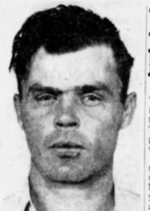 Fort Worth Star-Telegram, November 26, 1954
On May 22, 1952, the Pasodale Drug Store in El Paso, Texas, was robbed of $90 by an armed man. Store manager George W. Bush and an employee named John C. Dunda viewed a photo lineup. Bush and Dunda both identified a photograph of 25-year-old Kenneth Massey. Police arrested Massey and placed him in an in-person lineup with five other men. Bush and Dunda again identified Massey in this lineup as well. Massey was charged with armed robbery. The gun used in the robbery was never located.
Massey said he had been working at a farm north of El Paso in the days prior to the crime and was driving from there to Tucson, Arizona, at the time of the crime. Massey said his companion at that time was a man who was an illegal immigrant from Mexico, and the defense was unable to locate this man to support Massey’s alibi.
Massey’s jury trial in El Paso in the 34th District Court began in January 1953. Available records do not include the trial testimony and evidence, other than identifications by Dunda and Bush. After deliberating for an hour and a half, the jury found Massey guilty of armed robbery on January 12, 1953. He was sentenced to 15 years in prison and transferred to Eastham Prison Farm near Houston to serve his sentence.
In July 1954, authorities in Iowa arrested murder suspect William G. Karston after an intensive manhunt through three states. Karston soon confessed to the robbery-murder of Wendall W. Jones, a farmer in Pulaski, Iowa. Karston, who was living in El Paso in May 1952, also confessed to several other robberies, including the May 22, 1952 holdup of the Pasodale Drug Store and the May 12, 1952 robbery of the Indian Room, for which 21-year-old
Milford Bickford, Jr.
had been convicted. After learning of Karston’s confession, Jack Ross, a member of the Texas Board of Pardons and Paroles, said that this confession alone was not enough to cause Massey to be pardoned and released from prison. “We have to have tangible evidence… sufficient evidence presented to the board to justify a pardon,” he said.
In October 1954, Massey offered to submit to a polygraph examination to support his claim of innocence. Police scheduled a polygraph for Massey for the first week in November 1954, but available records do not indicate whether the polygraph was administered. Dunda, one of the witnesses, viewed photographs of Karston and then signed an affidavit saying he may have been mistaken in identifying Massey. Bush said that he could not have made such a mistake but admitted he saw a great similarity between Massey and Karston.
On November 4, 1954, Governor Allan Shivers granted a full pardon to Massey, and he was freed from prison that month. The Board of Paroles and Pardons issued a memorandum stating it was the Board’s “opinion that Kenneth Massey is not guilty of the offense of robbery for which he is now serving time in the Texas Prison System.”
Texas State Representative Richard White sponsored a bill to compensate Massey for his wrongful imprisonment, and the state paid Massey $8,000 on September 17, 1957.
- Meghan Barrett Cousino |